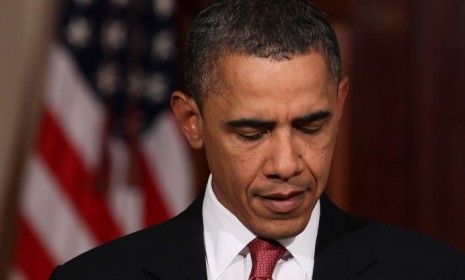Obama's 'inept' handling of Egypt's crisis
As protesters lambasted Mubarak for delaying his resignation, the White House took heat for its diplomatic struggles

A free daily email with the biggest news stories of the day – and the best features from TheWeek.com
You are now subscribed
Your newsletter sign-up was successful
After nearly three weeks of protests that paralyzed his country, Egyptian President Hosni Mubarak finally resigned today. The White House, which had been quietly pressuring Mubarak to concede to protesters, has faced wide criticism for its handling of the crisis, especially after Mubarak's defiant speech Thursday night, when he was still seemingly clinging to power. At the time, Mubarak explicitly rejected "foreign interventions or dictations" — leading one U.S. official to say that a sense of "disbelief" descended on the White House. Mubarak finally caved today — but critics of Obama have still attacked his "inept" leadership. Is that really fair? (See Egyptians celebrate after Mubarak's announcement)
Obama's bumbling response has been humiliating: It's difficult to see how Obama could have looked "more inept and less effective," says Jennifer Rubin at The Washington Post. At times, it has seemed like "high farce," with CIA chief Leon Panetta blithely indicating yesterday that Mubarak was on the way out while Obama beamed optimism from the White House. Obama's weakness only "emboldened Mubarak and confirmed that the U.S. lacks an understanding of, let alone the ability to, influence events."
"Obama ignored by Mubarak -- again"
The Week
Escape your echo chamber. Get the facts behind the news, plus analysis from multiple perspectives.

Sign up for The Week's Free Newsletters
From our morning news briefing to a weekly Good News Newsletter, get the best of The Week delivered directly to your inbox.
From our morning news briefing to a weekly Good News Newsletter, get the best of The Week delivered directly to your inbox.
This is Obama's 'Jimmy Carter moment': Obama's cluelessness hasn't just been "embarrassing," says Ross Kaminsky at American Spectator, but "dangerous." If our government appears confused and indecisive, it sows "instability across the whole region." This could well be our president's "Jimmy Carter moment." We can only hope his "projection of fecklessness and weakness" does not prompt our enemies to "act boldly."
Mubarak's exit proves that Obama was right: Now that Mubarak has stepped down, says Frank James at NPR, it's hard not to see this as an "immediate political win for President Obama." His decision to give tacit backing to the protestors and wait for "street heat" to force Mubarak out proved to be the "right bet." Time will tell whether democracy will take root, but "for the time being, it looks like events have worked out as well as they could have for Obama."
"Mubarak exit looks like Obama win, for now"
A free daily email with the biggest news stories of the day – and the best features from TheWeek.com
-
 Kurt Olsen: Trump’s ‘Stop the Steal’ lawyer playing a major White House role
Kurt Olsen: Trump’s ‘Stop the Steal’ lawyer playing a major White House roleIn the Spotlight Olsen reportedly has access to significant U.S. intelligence
-
 Rubio boosts Orbán ahead of Hungary election
Rubio boosts Orbán ahead of Hungary electionSpeed Read Far-right nationalist Prime Minister Viktor Orbán is facing a tough re-election fight after many years in power
-
 Hyatt chair joins growing list of Epstein files losers
Hyatt chair joins growing list of Epstein files losersSpeed Read Thomas Pritzker stepped down as executive chair of the Hyatt Hotels Corporation over his ties with Jeffrey Epstein and Ghislaine Maxwell